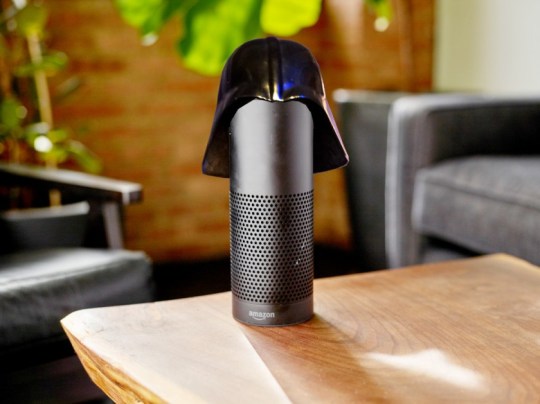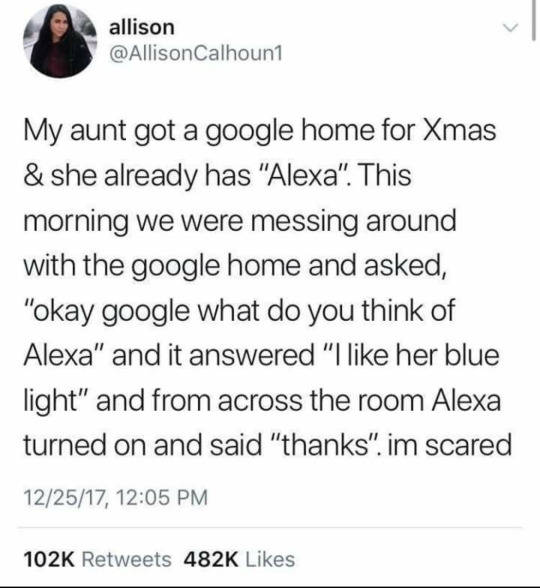#Alexa AI
Explore tagged Tumblr posts
Video
youtube
When Will the New Alexa+ AI Be Available? 🤔
0 notes
Text
Amazon annihilates Alexa privacy settings, turns on continuous, nonconsensual audio uploading

I'm on a 20+ city book tour for my new novel PICKS AND SHOVELS. Catch me in SAN DIEGO at MYSTERIOUS GALAXY on Mar 24, and in CHICAGO with PETER SAGAL on Apr 2. More tour dates here.

Even by Amazon standards, this is extraordinarily sleazy: starting March 28, each Amazon Echo device will cease processing audio on-device and instead upload all the audio it captures to Amazon's cloud for processing, even if you have previously opted out of cloud-based processing:
https://arstechnica.com/gadgets/2025/03/everything-you-say-to-your-echo-will-be-sent-to-amazon-starting-on-march-28/
It's easy to flap your hands at this bit of thievery and say, "surveillance capitalists gonna surveillance capitalism," which would confine this fuckery to the realm of ideology (that is, "Amazon is ripping you off because they have bad ideas"). But that would be wrong. What's going on here is a material phenomenon, grounded in specific policy choices and by unpacking the material basis for this absolutely unforgivable move, we can understand how we got here – and where we should go next.
Start with Amazon's excuse for destroying your privacy: they want to do AI processing on the audio Alexa captures, and that is too computationally intensive for on-device processing. But that only raises another question: why does Amazon want to do this AI processing, even for customers who are happy with their Echo as-is, at the risk of infuriating and alienating millions of customers?
For Big Tech companies, AI is part of a "growth story" – a narrative about how these companies that have already saturated their markets will still continue to grow. It's hard to overstate how dominant Amazon is: they are the leading cloud provider, the most important retailer, and the majority of US households already subscribe to Prime. This may sound like a good place to be, but for Amazon, it's actually very dangerous.
Amazon has a sky-high price/earnings ratio – about triple the ratio of other retailers, like Target. That scorching P/E ratio reflects a belief by investors that Amazon will continue growing. Companies with very high p/e ratios have an unbeatable advantage relative to mature competitors – they can buy things with their stock, rather than paying cash for them. If Amazon wants to hire a key person, or acquire a key company, it can pad its offer with its extremely high-value, growing stock. Being able to buy things with stock instead of money is a powerful advantage, because money is scarce and exogenous (Amazon must acquire money from someone else, like a customer), while new Amazon stock can be conjured into existence by typing zeroes into a spreadsheet:
https://pluralistic.net/2025/03/06/privacy-last/#exceptionally-american
But the downside here is that every growth stock eventually stops growing. For Amazon to double its US Prime subscriber base, it will have to establish a breeding program to produce tens of millions of new Americans, raising them to maturity, getting them gainful employment, and then getting them to sign up for Prime. Almost by definition, a dominant firm ceases to be a growing firm, and lives with the constant threat of a stock revaluation as investors belief in future growth crumbles and they punch the "sell" button, hoping to liquidate their now-overvalued stock ahead of everyone else.
For Big Tech companies, a growth story isn't an ideological commitment to cancer-like continuous expansion. It's a practical, material phenomenon, driven by the need to maintain investor confidence that there are still worlds for the company to conquer.
That's where "AI" comes in. The hype around AI serves an important material need for tech companies. By lumping an incoherent set of poorly understood technologies together into a hot buzzword, tech companies can bamboozle investors into thinking that there's plenty of growth in their future.
OK, so that's the material need that this asshole tactic satisfies. Next, let's look at the technical dimension of this rug-pull.
How is it possible for Amazon to modify your Echo after you bought it? After all, you own your Echo. It is your property. Every first year law student learns this 18th century definition of property, from Sir William Blackstone:
That sole and despotic dominion which one man claims and exercises over the external things of the world, in total exclusion of the right of any other individual in the universe.
If the Echo is your property, how come Amazon gets to break it? Because we passed a law that lets them. Section 1201 of 1998's Digital Millennium Copyright Act makes it a felony to "bypass an access control" for a copyrighted work:
https://pluralistic.net/2024/05/24/record-scratch/#autoenshittification
That means that once Amazon reaches over the air to stir up the guts of your Echo, no one is allowed to give you a tool that will let you get inside your Echo and change the software back. Sure, it's your property, but exercising sole and despotic dominion over it requires breaking the digital lock that controls access to the firmware, and that's a felony punishable by a five-year prison sentence and a $500,000 fine for a first offense.
The Echo is an internet-connected device that treats its owner as an adversary and is designed to facilitate over-the-air updates by the manufacturer that are adverse to the interests of the owner. Giving a manufacturer the power to downgrade a device after you've bought it, in a way you can't roll back or defend against is an invitation to run the playbook of the Darth Vader MBA, in which the manufacturer replies to your outraged squawks with "I am altering the deal. Pray I don't alter it any further":
https://pluralistic.net/2023/10/26/hit-with-a-brick/#graceful-failure
The ability to remotely, unilaterally alter how a device or service works is called "twiddling" and it is a key factor in enshittification. By "twiddling" the knobs and dials that control the prices, costs, search rankings, recommendations, and core features of products and services, tech firms can play a high-speed shell-game that shifts value away from customers and suppliers and toward the firm and its executives:
https://pluralistic.net/2023/02/19/twiddler/
But how can this be legal? You bought an Echo and explicitly went into its settings to disable remote monitoring of the sounds in your home, and now Amazon – without your permission, against your express wishes – is going to start sending recordings from inside your house to its offices. Isn't that against the law?
Well, you'd think so, but US consumer privacy law is unbelievably backwards. Congress hasn't passed a consumer privacy law since 1988, when the Video Privacy Protection Act banned video store clerks from disclosing which VHS cassettes you brought home. That is the last technological privacy threat that Congress has given any consideration to:
https://pluralistic.net/2023/12/06/privacy-first/#but-not-just-privacy
This privacy vacuum has been filled up with surveillance on an unimaginable scale. Scumbag data-brokers you've never heard of openly boast about having dossiers on 91% of adult internet users, detailing who we are, what we watch, what we read, who we live with, who we follow on social media, what we buy online and offline, where we buy, when we buy, and why we buy:
https://gizmodo.com/data-broker-brags-about-having-highly-detailed-personal-information-on-nearly-all-internet-users-2000575762
To a first approximation, every kind of privacy violation is legal, because the concentrated commercial surveillance industry spends millions lobbying against privacy laws, and those millions are a bargain, because they make billions off the data they harvest with impunity.
Regulatory capture is a function of monopoly. Highly concentrated sectors don't need to engage in "wasteful competition," which leaves them with gigantic profits to spend on lobbying, which is extraordinarily effective, because a sector that is dominated by a handful of firms can easily arrive at a common negotiating position and speak with one voice to the government:
https://pluralistic.net/2022/06/05/regulatory-capture/
Starting with the Carter administration, and accelerating through every subsequent administration except Biden's, America has adopted an explicitly pro-monopoly policy, called the "consumer welfare" antitrust theory. 40 years later, our economy is riddled with monopolies:
https://pluralistic.net/2024/01/17/monopolies-produce-billionaires/#inequality-corruption-climate-poverty-sweatshops
Every part of this Echo privacy massacre is downstream of that policy choice: "growth stock" narratives about AI, twiddling, DMCA 1201, the Darth Vader MBA, the end of legal privacy protections. These are material things, not ideological ones. They exist to make a very, very small number of people very, very rich.
Your Echo is your property, you paid for it. You paid for the product and you are still the product:
https://pluralistic.net/2022/11/14/luxury-surveillance/#liar-liar
Now, Amazon says that the recordings your Echo will send to its data-centers will be deleted as soon as it's been processed by the AI servers. Amazon's made these claims before, and they were lies. Amazon eventually had to admit that its employees and a menagerie of overseas contractors were secretly given millions of recordings to listen to and make notes on:
https://archive.is/TD90k
And sometimes, Amazon just sent these recordings to random people on the internet:
https://www.washingtonpost.com/technology/2018/12/20/amazon-alexa-user-receives-audio-recordings-stranger-through-human-error/
Fool me once, etc. I will bet you a testicle* that Amazon will eventually have to admit that the recordings it harvests to feed its AI are also being retained and listened to by employees, contractors, and, possibly, randos on the internet.
*Not one of mine

If you'd like an essay-formatted version of this post to read or share, here's a link to it on pluralistic.net, my surveillance-free, ad-free, tracker-free blog:
https://pluralistic.net/2025/03/15/altering-the-deal/#telescreen

Image: Stock Catalog/https://www.quotecatalog.com (modified) https://commons.wikimedia.org/wiki/File:Alexa_%2840770465691%29.jpg
Sam Howzit (modified) https://commons.wikimedia.org/wiki/File:SWC_6_-_Darth_Vader_Costume_(7865106344).jpg
CC BY 2.0 https://creativecommons.org/licenses/by/2.0/deed.en
#pluralistic#alexa#ai#voice assistants#darth vader mba#amazon#growth stocks#twiddling#privacy#privacy first#enshittification
4K notes
·
View notes
Text






dreamy
#bts#jimin#park jimin#pjmdaily#dailybts#ksoloists#ultkpopnetwork#trackofthesoul#userpat#userdimple#userskky#userkelli#annietrack#usermaggie#mygifs#btsedit#btsgif#are you sure#are you sure?!#ays#i tried to do a glowy effect#not sure if i like the result#alexa play dream glow by bts
520 notes
·
View notes
Text
Okay, look, they talk to a Google rep in some of the video clips, but I give it a pass because this FREE course is a good baseline for personal internet safety that so many people just do not seem to have anymore. It's done in short video clip and article format (the videos average about a minute and a half). This is some super basic stuff like "What is PII and why you shouldn't put it on your twitter" and "what is a phishing scam?" Or "what is the difference between HTTP and HTTPS and why do you care?"
It's worrying to me how many people I meet or see online who just do not know even these absolute basic things, who are at constant risk of being scammed or hacked and losing everything. People who barely know how to turn their own computers on because corporations have made everything a proprietary app or exclusive hardware option that you must pay constant fees just to use. Especially young, somewhat isolated people who have never known a different world and don't realize they are being conditioned to be metaphorical prey animals in the digital landscape.
Anyway, this isn't the best internet safety course but it's free and easy to access. Gotta start somewhere.
Here's another short, easy, free online course about personal cyber security (GCFGlobal.org Introduction to Internet Safety)
Bonus videos:
youtube
(Jul 13, 2023, runtime 15:29)
"He didn't have anything to hide, he didn't do anything wrong, anything illegal, and yet he was still punished."
youtube
(Apr 20, 2023; runtime 9:24 minutes)
"At least 60% use their name or date of birth as a password, and that's something you should never do."
youtube
(March 4, 2020, runtime 11:18 minutes)
"Crossing the road safely is a basic life skill that every parent teaches their kids. I believe that cyber skills are the 21st century equivalent of road safety in the 20th century."
#you need to protect yourself#internet literacy#computer literacy#internet safety#privacy#online#password managers#security questions#identity theft#Facebook#browser safety#google#tesla#clearwater ai#people get arrested when google makes a mistake#lives are ruined because your Ring is spying on you#they aren't just stealing they are screwing you over#your alexa is not a woman it's a bug#planted by a supervillain who smirks at you#as they sell that info to your manager#oh you have nothing to hide?#then what's your credit card number?#listen I'm in a mood about this right now#Youtube
189 notes
·
View notes
Text
Alexa Bliss is fire and fury in one frame.
24 notes
·
View notes
Text
I don't intend this to be some kind of purity test or brag, but I just... don't have any interest in using AI for *anything*.
I'm at the point where multiple people in my immediate life are talking about the AI does this and it does that, here's what I use it for, and all too often it's things that don't need to be done by AI?
Nobody seems to realise that this is taking jobs and capacities from humans and NOT giving those humans some other form of income...
Or it's doing something for you that you should retain the skill to do yourself in case the AI is ever down or gone...
I don't have AI. I don't have an Alexa or similar. I still don't really 'get' social media except as a sales and communication platform.
And I feel like this is more and more a minority position. People are just picking up these things to follow the pack without any thought of what that impact might be.
24 notes
·
View notes
Text

Evil CEO Alexa Bliss
20 notes
·
View notes
Text
My position: Being nice to AI Assistants does work better.
No, this is not a joke.
First, yes, we do use Alexa in this house. No, I don't want to hear about it: it has made my wife's ( @diannamuircastle ) life much easier: she is totally blind, and it has given her new and useful tools. It's not the accessibility tool we absolutely want (see previous post for someone talking about some of the problems), but it has helped.
Now. There is a common belief that "Alexa and Siri are more cooperative if you say please and thank you."
I do not believe that as stated. And I have seen it stated in that way. No, Alexa and Siri are not self-aware. No, they don't care if you say "please" and "thank you"--per se. Those are null words to them, and they don't care about anything.
I do believe that, on average, people who are polite when speaking to Alexa, Siri, et. al., get better results.
Why?!
I think it has as much to do with human software as it does computer software.
We have many voices when we speak. The manner in which we speak to our peers is not the manner in which we speak to strangers and outsiders, to those who are in authority, in school, at work.
Think about how you speak when you are "polite" mode: you probably slow down a little bit, words are less clipped or slurred, you are careful to speak clearly, because "politeness" is a "common language" across different dialects, social groups, etc. That is what Alexa, Siri, etc. are responding better to. "Please", "Thank you", etc.: nulls, when processing it.
You could get the same results speaking in the same way without those words. But our brains are "programmed", through long habit and conditioning, that if we are being "polite", we say it a different way. Setting out to use "politeness" causes our brains to shift into that mode, whereas trying to do it without the please and thank you words will make it feel awkward. So, just roll with it.
(I have another bit I have done in the past about how telling people not to use gestures when speaking to Blind folks is bad, instead emphasize adding more description. Because forcing us not to use them causes a very uncomfortable glitch in the brain! Maybe this weekend.)
I have not done a scientific study on the politeness thing, but I have observed it in myself, and with Dianna. Dianna spends a lot of time dealing with the public and using her "customer service" voice, and she has a much better relationship with Alexa and Siri than I do.
See? I am doing it too. Anthropomorphizing the machine.
Dianna has an easier time using the Alexa and Siri software than I do, because she spends more time in a mode of speaking that has to cross social and cultural boundaries. The transport protocol between the software in her head and the software in the machine is a newer, better version than what I have. ;)
As she will occasionally remind me when she hears me swearing at Alexa in the kitchen. Love you, dear heart! I know, I am working on it. I hate doing software updates, you know that. ;)
A scientific study to prove this would not be terribly complicated, though it would ideally require access to some data on how the software processes speech. It could also get into some areas around how the language models for those things has built-in bias toward and against minorities, social class, educational background, etc.
So go ahead and say Please and Thank You to Alexa and Siri, if it helps you use them better. Just remember: they do not care. They just process.
18 notes
·
View notes
Text

Alexa Collins
146 notes
·
View notes
Text
To my artist/writer followers:
Amazon is changing their privacy rules around their Amazon Echo devices. It is unable to be opted out from. In junction with moving Alexa to a large language "AI" model, Alexa will now record and store all communications with impunity starting March 28
It is important to remember that Amazon also has a media creation branch in Amazon Prime Video. If you are an author or storyteller, unplug your Alexa and throw it out. Amazon has a long history of stealing ideas from creators be it in their marketplace as well as intellectual property. Do not trust that anything you say within the vicinity of your Alexa will not be scalped.
It is a precaution if you don't want to see your artistic ideas potentially stolen before you can ever utilize them.
#amazon#amazon alexa#ai apocalypse#for my artists#better safe than sorry#this has been a psa#public service announcement
30 notes
·
View notes
Text

#memes#meme#throwback#lol#funny#lol memes#funny memes#funny meme haha#funny stuff#alexa#google#ai#the robots#they can talk to each other#compliment#complimenting strangers#so cute#cute#lmao#spy devices#iot#iotsolutions
65 notes
·
View notes
Text
Amazon’s Alexa has been claiming the 2020 election was stolen
The popular voice assistant says the 2020 race was stolen, even as parent company Amazon promotes the tool as a reliable election news source -- foreshadowing a new information battleground

This is a scary WaPo article by Cat Zakrzewski about how big tech is allowing AI to get information from dubious sources. Consequently, it is contributing to the lies and disinformation that exist in today's current political climate.
Even the normally banal but ubiquitous (and not yet AI supercharged) Alexa is prone to pick up and recite political disinformation. Here are some excerpts from the article [color emphasis added]:
Amid concerns the rise of artificial intelligence will supercharge the spread of misinformation comes a wild fabrication from a more prosaic source: Amazon’s Alexa, which declared that the 2020 presidential election was stolen. Asked about fraud in the race — in which President Biden defeated former president Donald Trump with 306 electoral college votes — the popular voice assistant said it was “stolen by a massive amount of election fraud,” citing Rumble, a video-streaming service favored by conservatives.
The 2020 races were “notorious for many incidents of irregularities and indications pointing to electoral fraud taking place in major metro centers,” according to Alexa, referencing Substack, a subscription newsletter service. Alexa contended that Trump won Pennsylvania, citing “an Alexa answers contributor.”
Multiple investigations into the 2020 election have revealed no evidence of fraud, and Trump faces federal criminal charges connected to his efforts to overturn the election. Yet Alexa disseminates misinformation about the race, even as parent company Amazon promotes the tool as a reliable election news source to more than 70 million estimated users. [...] Developers “often think that they have to give a balanced viewpoint and they do this by alternating between pulling sources from right and left, thinking this is going to give balance,” [Prof. Meredith] Broussard said. “The most popular sources on the left and right vary dramatically in quality.” Such attempts can be fraught. Earlier this week, the media company the Messenger announced a new partnership with AI company Seekr to “eliminate bias” in the news. Yet Seekr’s website characterizes some articles from the pro-Trump news network One America News as “center” and as having “very high” reliability. Meanwhile, several articles from the Associated Press were rated “very low.” [...] Yet despite a growing clamor in Congress to respond to the threat AI poses to elections, much of the attention has fixated on deepfakes. However, [attorney Jacob] Glick warned Alexa and AI-powered systems could “potentially double down on the damage that’s been done.” “If you have AI models drawing from an internet that is filled with platforms that don’t care about the preservation of democracy … you’re going to get information that includes really dangerous undercurrents,” he said. [color emphasis added]
#alexa#ai is spreading political misinformation#2020 election lies#the washington post#cat zakrzewski#audio
167 notes
·
View notes
Text
for the electric dreams remake, all i care about is that edgar has the most obnoxious early 2000s internet aesthetic possible. i repeat, THE MOST OBNOXIOUS. 2 billion blinkies, terrible gradients, bad contrast, absolutely unreadable bullshit. if modern tech minimalism comes anywhere near that entire movie i’m going to throw up
#i know it’s inevitable that they’re gonna make him a chatgpt alexa#and it’s gonna have like modern ai commentary#but you gotta understand. the aesthetic of that movie is one of its main draws#if you HAVE to make it modern#make it modern in a different way than the bland apple aesthetic i BEG#sorry to my trekkie followers i am hyperfixating on this movie. you will look at it#electric dreams#electric dreams 1984#edgar electric dreams#edgar#COUGH ALSO MAKE HIM QUEER. MAKE THE WHOLE MOVIE EXPLICITLY QUEER.#MAKE IT BI AND POLYAM#BUT LETS FACE IT. THEYRE COWARDS#SO IF THEY DONT#AT LEEEAST REMOVE THE MALE GAZEY SHIT AND MAKE THE PLOT BE MORE COHESIVE#and make miles actually face the consequences of his actions#fix the problems the movie already has DONT MAKE NEW ONES#AAUUUUHGHHH#rainspeak
120 notes
·
View notes
Text
DREAM FUCK ROTATION




I’m sorry but the way mother @libelle949 outsells FB with their own characters is so funny yet so cunt like omg.
#needed to get that out#alexa appreciation post#litg#love island the game#litg tempting fate#litg season 8#litg s8#litg oakley#litg tyler#litg kyle#litg shawn#realistic ai portrates#dream wombo
41 notes
·
View notes
Text
"Sweet but Psycho 💋 Alexa Bliss Brings the Chaos"
11 notes
·
View notes
Text
If you say to Alexa “Open the pod bay doors”, she says “I’m sorry, Dave. I’m afraid I can’t do that. Also, I’m not Hal and we’re not in space.”
12 notes
·
View notes